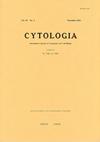Effects of cytoplasm from the related wild species <i>Aegilops mutica</i> on agronomic characters in Japanese bread wheat cultivars
IF 0.4
4区 生物学
Q4 CELL BIOLOGY
引用次数: 0
Abstract
Alloplasmic lines or cytoplasmic substitution lines of bread wheat (Triticum aestivum) that have cytoplasm from a related wild Aegilops species through recurrent backcrossing exhibit several useful characteristics for wheat breeding. Using an alloplasmic line initially developed by Professor Tsunewaki, we derived new alloplasmic lines for 14 Japanese bread wheat cultivars with Aegilops mutica cytoplasm to examine the effects of the cytoplasm on agronomic characters. All alloplasmic lines showed delayed heading time (4 to 17 days in the field) compared with the euplasmic lines, and the degree of heading delay depended on VERNALIZATION1 (VRN1) genotype. In spring wheat cultivars such as ‘Minaminokaori’ that carry the dominant VRN-A1 allele, the degree of heading delay due to the alien cytoplasm was large; by contrast, in winter wheat cultivars such as ‘Haruibuki’ that carry recessive vrn1 alleles in three homoeologous genes, the heading delay was small. Compared with euplasmic lines, the alloplasmic lines generally showed increased spikelet number per spike, but decreased floret number per spikelet, leading to decreased grain number per spike (GNS). However, GNS varied depending on genotype; in the alloplasmic lines of ‘Nanbukomugi,’ ‘Nebarigoshi,’ and ‘Fukusayaka,’ no decrease in GNS occurred. Furthermore, the ‘Nebarigoshi’ and ‘Fukusayaka’ alloplasmic lines could suppress the decrease in spike number per plant during winter due to delayed flowering. These alloplasmic lines will be useful for the development of varieties adapted to global warming.野生近缘种黄花莲细胞质的影响<i> /i>日本面包小麦品种农艺性状研究
面包小麦(Triticum aestivum)的同种异质系或细胞质替代系通过反复回交获得的细胞质来自野生近缘种Aegilops,这对小麦育种具有一些有用的特性。利用Tsunewaki教授最初开发的异质系,我们为14个日本面包小麦品种获得了新的异质系,并研究了细胞质对农艺性状的影响。所有异质系均表现出抽穗期延迟(田间4 ~ 17 d),且抽穗期延迟程度与春化1 (VRN1)基因型有关。在携带VRN-A1显性等位基因的‘minaminokaoori’等春小麦品种中,因外源细胞质导致的抽穗延迟程度较大;相比之下,在三个同源基因中携带vrn1隐性等位基因的冬小麦品种,如“春树”,抽穗延迟较小。与正浆系相比,异质系总体表现为每穗小穗数增加,而每穗小花数减少,导致每穗粒数下降。然而,GNS因基因型而异;在“南布komugi”、“Nebarigoshi”和“Fukusayaka”的同种细胞系中,GNS没有下降。此外,“Nebarigoshi”和“Fukusayaka”同种异质系可以抑制冬季因开花延迟而导致的单株穗数下降。这些异质系将有助于培育适应全球变暖的品种。
本文章由计算机程序翻译,如有差异,请以英文原文为准。
求助全文
约1分钟内获得全文
求助全文
来源期刊

Cytologia
CELL BIOLOGY-GENETICS & HEREDITY
CiteScore
1.50
自引率
60.00%
发文量
48
审稿时长
>12 weeks
期刊介绍:
CYTOLOGIA, International Journal of Cytogenetics and Cell Biology, will receive original articles in the field of Cell Sciences including cytology, cytogenetics, and cell biology of a wide range of organisms studied using various research methods. Editors shall decide whether manuscripts meet publication criteria in this journal after reviewing by peers. CYTOLOGIA is published quarterly on March, June, September and December except otherwise stated.
 求助内容:
求助内容: 应助结果提醒方式:
应助结果提醒方式:


